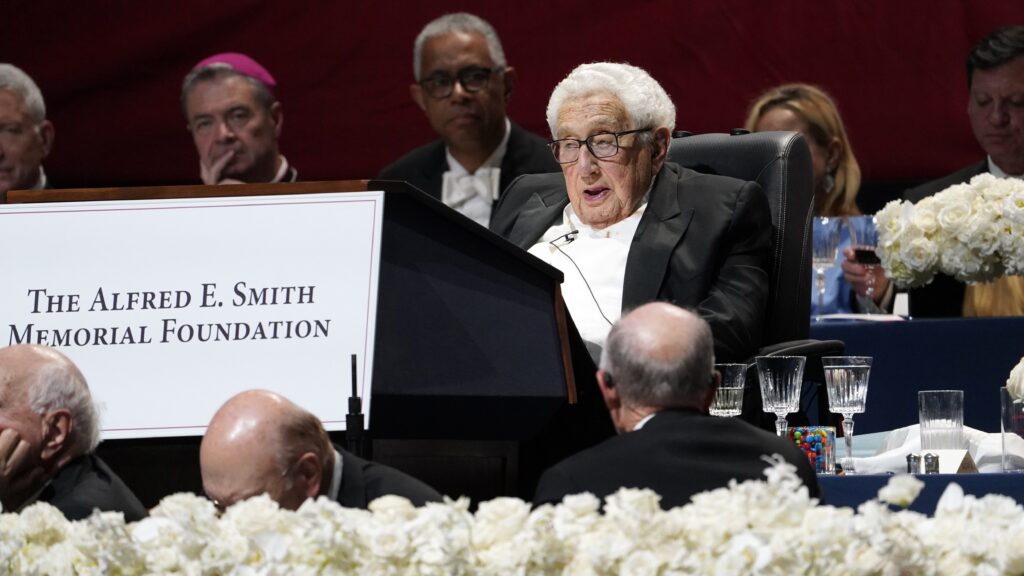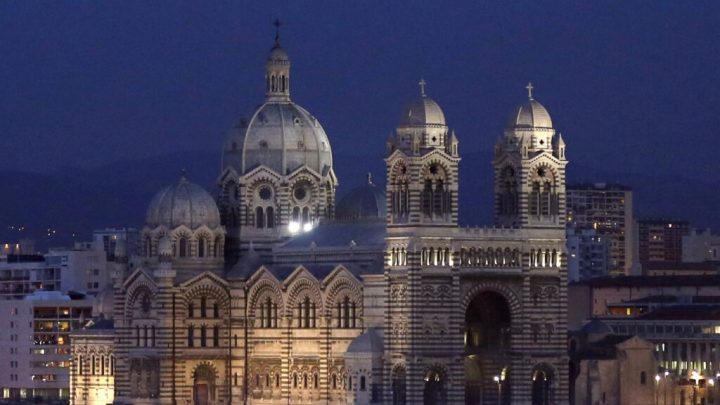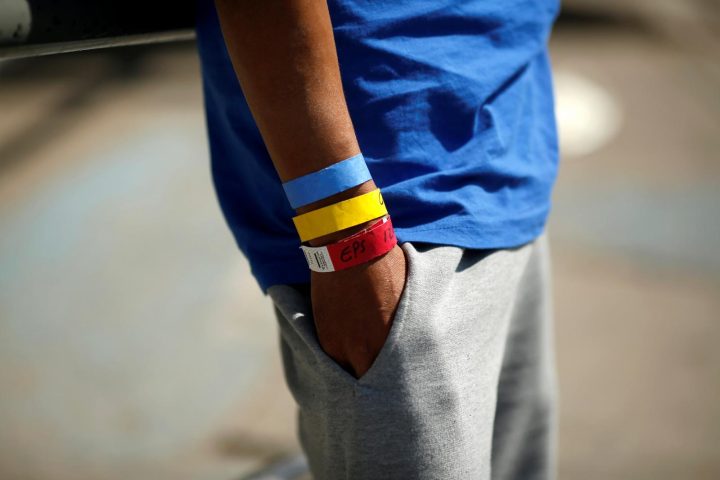
NEW YORK (OSV News) — In a time of international tensions and domestic divisions, it is crucial for leaders to bridge the gap between political strategy and practical tactics, said centenarian statesman Henry A. Kissinger, who headlined the 78th dinner of the Alfred E. Smith Memorial Foundation Oct. 19.
The current risks are so great that “we cannot afford a divided nation in a world in which nuclear power is matched by the growth of artificial intelligence, which removes all obstacles to accuracy and distance,” the former U.S. secretary of state and Nobel Peace Prize laureate said.
Quoting his 1974 address to the foundation dinner, Kissinger said, “Societies do not grow by victories of one faction over another, but by reconciliations.”
Kissinger has been a frequent fixture on the dais at the Al Smith Dinner since 1974, his participation interrupted only by the COVID-19 pandemic. The dinner honors the memory of the former four-term governor of New York, who was the first Catholic nominated by a major political party to run for president of the United States.
Cardinal Timothy M. Dolan of New York returned briefly from the Synod on Synodality in Rome to host the formal event at the Park Avenue Armory. It drew more than 850 guests and raised $7 million, a new record for a year in which presidential nominees are not the headliners. Proceeds from the $5,000-a-plate event benefit Catholic organizations that serve New York’s most vulnerable children, while advancing education, health services and family resources.
Guests in formal attire sat amid candlelight and flower arrangements and dined on a roasted local squash appetizer, grilled filet, and a dessert of Hudson Valley caramelized apples and warm spice cake.
The mistress of ceremonies was Mary Callahan Erdoes, vice chairperson of the Alfred E. Smith Memorial Foundation’s board of directors and CEO of JPMorgan Chase’s Asset and Wealth Management.
Matthew Polenzani, a tenor with the Metropolitan Opera, sang the National Anthem to open the dinner.
By tradition, the festive evening is a command performance for political, religious and philanthropic New Yorkers, who gather to watch those with household names poke gentle fun at one another in the style of a roast. This year, the accustomed levity was overshadowed somewhat by concern for the ongoing crises in Israel, Gaza and Ukraine.
Cardinal Dolan said it was harder to be happy this year in the light of horror, assault, bloodshed, hostage-taking and lives lost. He acknowledged Ukrainian Catholic Archbishop Borys A. Gudziak of Philadelphia on the dais and invited New York Rabbi Joseph Potasnik to join him at the podium for the invocation.
“Our Jewish neighbors and friends have traditionally been a big part of this evening,” Cardinal Dolan said. “They have not let us down and we are not about to let them down.”
He also announced that the Alfred E. Smith Memorial Foundation made an initial $150,000 donation to the United Jewish Appeal Federation of New York, an organization Smith himself had promoted. Dolan also said Catholic parishes in the Archdiocese of New York would conduct a second collection for those in need in the Holy Land.
During the dinner, the Happy Warrior Award was presented to Rob Speyer, CEO of Tishman Speyer, an international real estate development and management firm. The distinction recalls the nickname given to Smith by Franklin D. Roosevelt at the 1924 Democratic Convention. The award recognizes someone who epitomizes Smith’s character, grace and leadership by making a positive impact on others.
Speyer started on a serious note. He said he always felt welcome and protected in his relationship with Cardinal Dolan, the archdiocese and the people at the event. With the heartbreaking events of the past two weeks, he said, “It feels incredibly vulnerable to be a Jew right now, but the Al Smith dinner has always been a secure and safe home filled with love and laughter” and quipped that Cardinal Dolan had given him a special dispensation to be funny that night.
He pointed out prominent Jewish men with him on the three-tiered dais, including Kissinger, New York Sen. Chuck Schumer, Pfizer CEO Albert Bourla and sports executive Robert Kraft. “It’s wonderful to be here for the Al Smith Foundation Bar Mitzvah!”
Speyer went on to poke fun at President Joe Biden, New York State Attorney General Leticia James and former President Donald Trump. He said it was an honor to warm up the crowd for Kissinger.
In his remarks, Kissinger said the three most pressing problems leaders need to address are China, Ukraine and Russia, and the growth of artificial intelligence.
The United States can never relax its efforts to build a military capacity that is equal or superior to China’s, he said, but must remember that the two countries also have the power to destroy each other and civilization. Much depends on whether the leaders of the two countries can find a context in which they can prevent that fate, he said. He wished Biden success in upcoming negotiations, but advised him to “keep his powder dry, and stay strong enough to make the task possible.”
Kissinger said, “Ukraine has achieved outstanding success in stopping the perennial threat of Russia to Europe, which has existed since the days of Napoleon.” He supported independence and freedom for Ukraine, and he said its admission to NATO membership is a precondition of European security.
He said artificial intelligence, inconceivable a decade ago, is a new reality. “Created by man, it has the capacity to destroy humanity,” he said, and the ways in which it works are not fully understood.
“We have to avoid the day in which it can become an autonomous force,” he warned.
Kissinger decried the recent “horrendous tragedies” in Israel and said the country must not “become another ghetto in a hostile world.”
Despite the complexity of the issues, Kissinger said, “The future is one of hope if America has confidence in itself, and if it does not dissipate its virtues by internal divides. On that basis, I hope we can build a peace of strength and conciliation in the next decade.”
Beth Griffin writes for OSV News from New York.



